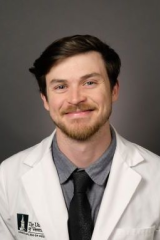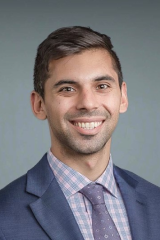2025-2026 cohort
Anita Chopra, MD
Dr. Anita Chopra is a Clinical Associate Professor in the Department of Medicine and an Adjunct Clinical Associate Professor in the Department of Rehabilitation Medicine at the University of Washington. She serves as a lead physician and researcher in the UW Long COVID clinic. Her interdisciplinary expertise—spanning internal medicine, chronic disease management, rehabilitation, and public health—guides her commitment to diagnostic excellence, health equity, and clinician empowerment.
Dr. Chopra co-leads provider and community engagement efforts that strengthen diagnostic pathways for infection-associated chronic conditions such as Long COVID. She is the Chair of the American College of Physicians (ACP) Long COVID Interest Group, where she develops national educational programming on diagnostic reasoning, clinical decision-making, and complex chronic care. As co-host of the Long COVID Clinical Podcast, she provides peer-led education to clinicians internationally, with a focus on interdisciplinary care models and practical strategies for navigating diagnostic uncertainty.
She also directs Northwest Health and Wellness, a nonprofit initiative that organizes free health fairs to deliver preventive and primary care services to underserved communities, while promoting diagnostic safety and culturally responsive communication. She is leading national efforts to improve diagnostic accessibility and excellence through education, implementation science, and community-driven innovation.
A dedicated educator and mentor, Dr. Chopra, brings a coaching approach grounded in clarity, purpose, and growth. She works with medical students (MS1–MS4), internal medicine residents, and early-career physicians to help them define their vision, set specific and actionable goals, and create a plan for meaningful and sustainable change. Drawing on her interdisciplinary background in internal medicine, rehabilitation, public health, and community engagement, Dr. Chopra provides a supportive space for reflection, exploration, and decision-making.
Her coaching philosophy centers on listening deeply, asking purposeful questions, and empowering each learner to move from where they are to where they want to be—while aligning their values with their professional path and helping them sustain meaningful, long-term growth.
Project Overview: The National Academies of Science, Engineering and Medicine (NASEM) define, Long Covid as an infection-associated chronic condition (IACC) that occurs after SARS-CoV-2 infection and persists for at least three months as a continuous, relapsing, remitting, or progressive disease state affecting one or more organ systems. In the United States, an estimated 10% of adults (over 20 million people) are currently living with LC. This staggering prevalence underscores a growing public health crisis, as patients frequently face prolonged disability, impaired quality of life, and difficulty performing daily activities. With symptoms spanning multiple organ systems (e.g., fatigue, cognitive dysfunction, cardiovascular and autonomic disturbances) Long Covid presents immense clinical and societal challenges that demand urgent, coordinated action.
Vikash Nand, MD
 Dr. Vikash Nand is a Clinical Assistant Professor in Medicine, Division of General Internal Medicine, and attending physician at Harborview Medical Center. Dr. Nand graduated from St. Matthews University School of Medicine and completed his Internal Medicine residency at Danbury Hospital. He worked for 5 years as an inpatient hospitalist in Lowell, Massachusetts, and is certified by the American Board of Internal Medicine & Obesity Medicine. Dr. Nand spends the majority of clinical time as an admitting physician and mentoring interns on the overnight teaching service.
Dr. Vikash Nand is a Clinical Assistant Professor in Medicine, Division of General Internal Medicine, and attending physician at Harborview Medical Center. Dr. Nand graduated from St. Matthews University School of Medicine and completed his Internal Medicine residency at Danbury Hospital. He worked for 5 years as an inpatient hospitalist in Lowell, Massachusetts, and is certified by the American Board of Internal Medicine & Obesity Medicine. Dr. Nand spends the majority of clinical time as an admitting physician and mentoring interns on the overnight teaching service.
Project Overview: Everyday patients are admitted to hospitals across the system and to different service lines from surgery to medicine. Unfortunately, some of those hospitalizations are not adequately compensated by insurance based on physician documentation. This project aims to reduce the rate of payor denials for indicated inpatient hospitalizations at the University of Washington. The hospital’s utilization management physicians and nurses work tirelessly to reverse those determinations through peer to peers and coordinate appeals for post hospitalization denial of payment for care provided. Current data suggests that a high number of those denials are overturned and suggest that improving gaps in documentation may improve denial prevention. Ultimately our documentation not only plays a role in reimbursement but informs CMS/AHRQ and similar organizations about how well we take care of sick patients and prevent adverse outcomes. Our goal is to develop targeted interventions to improve documentation that reflects the complexity of care that is provided at our busy tertiary center.
Yue-Harn Ng, MD, MPH
 Dr. Yue-Harn Ng is a Clinical Professor in the Division of Nephrology and is the Diversity, Equity and Inclusion lead in her division with a special interest in improving healthcare access in the underserved population. She completed her medical school at McGill University in Montreal, Canada and went on to pursue her Internal Medicine, Nephrology as well as Transplant Nephrology fellowship at the University of Pittsburgh Medical Center. Dr. Ng’s research interest is on the impact of social determinants of health in access to kidney transplant. She has worked with the National Kidney Foundation on numerous projects with the aim to improve access to kidney transplant for all thru advocacy and education of patients and kidney disease providers.
Dr. Yue-Harn Ng is a Clinical Professor in the Division of Nephrology and is the Diversity, Equity and Inclusion lead in her division with a special interest in improving healthcare access in the underserved population. She completed her medical school at McGill University in Montreal, Canada and went on to pursue her Internal Medicine, Nephrology as well as Transplant Nephrology fellowship at the University of Pittsburgh Medical Center. Dr. Ng’s research interest is on the impact of social determinants of health in access to kidney transplant. She has worked with the National Kidney Foundation on numerous projects with the aim to improve access to kidney transplant for all thru advocacy and education of patients and kidney disease providers.
Project Overview: Kidney transplant is the preferred treatment option for the majority of the 800,000 Americans currently living with end-stage kidney disease. Unfortunately, every year only 12.1% and 3.2% of end stage kidney disease patients will be waitlisted for or receive a transplant, respectively. Obesity, common among people with ESKD, is one of the reasons that often preclude individuals from being considered eligible for a kidney transplant. In this pilot project, we aim to assess if a coordinated kidney transplant-bariatric clinic for young (age <40), obese (BMI > 40) KT candidates, whereby a supervised weight loss and kidney transplant evaluation process can be performed in parallel, can: improve the KT waitlisting rates and reduce the time from referral to KT waitlisting.
2024-2025 cohort
Efstathia Andrikopoulou, MD
Dr. Andrikopoulou is an Associate Professor of Medicine at the University of Washington and the Medical Director of the Echocardiography Lab at Harborview Medical Center. She completed her internal medicine training at Thomas Jefferson University in Philadelphia, cardiology fellowship at the University of Alabama at Birmingham (UAB), and advanced multimodality cardiovascular imaging training at Brigham and Women's Hospital in Boston. Dr. Andrikopoulou also holds an MBA from UAB. She is an expert in Cardiovascular Imaging with a clinical niche in Cardio-Oncology. Dr. Andrikopoulou is a rising leader in the space of artificial intelligence. Driven by a deep commitment to delivering excellent, equitable care to all patients, Dr. Andrikopoulou focuses on developing and implementing innovative clinical programs, processes, and workflows. She is passionate about creating tools and solutions that ensure high-quality care is accessible to patients and communities regardless of their socioeconomic background, making her a rising leader in healthcare innovation and quality improvement.
Project Overview: This project aims to reduce the incidence of no-shows and same-day cancellations for outpatient appointments at the UW Medicine Echocardiography labs. By conducting a comprehensive analysis of patient demographics, behaviors, and socioeconomic factors, we will identify predictors of no-shows and cancellations. Our goal is to develop targeted interventions that optimize scheduling efficiency and improve patient engagement, thereby enhancing overall quality of care delivery and operational efficiency in our Echocardiography labs.
Anubhav Amin, MD
 Dr. Anubhav Amin is an Assistant Professor in the Department of Neurological Surgery. He specializes in spine surgery and has an academic and clinical focus on spinal oncology. Dr. Amin received his medical degree from the Johns Hopkins University School of Medicine, completed neurosurgery residency at New York Medical College at Westchester Medical Center, and then pursued a neurosurgical oncology fellowship at Memorial Sloan Kettering Cancer Center, focusing on spinal oncology.
Dr. Anubhav Amin is an Assistant Professor in the Department of Neurological Surgery. He specializes in spine surgery and has an academic and clinical focus on spinal oncology. Dr. Amin received his medical degree from the Johns Hopkins University School of Medicine, completed neurosurgery residency at New York Medical College at Westchester Medical Center, and then pursued a neurosurgical oncology fellowship at Memorial Sloan Kettering Cancer Center, focusing on spinal oncology.
Project Overview: Treatment of spinal metastases is multifaceted, often requiring a combination of medical management, surgery, radiation, as well as rehabilitation. The treatments offered must be individualized to patient specific factors and goals. While clinical decision frameworks exist to guide treatment in this medically complex patient population, its implementation in an emergent clinical setting is lacking, leading to inconsistent delivery of healthcare and inefficiencies. The objective of this quality improvement initiative is to implement a metastatic spinal cord compression protocol the University of Washington Montlake Emergency Department in conjunction with the Fred Hutchinson Cancer Center to standardized management of metastatic cancer patients who present with an acute neurological deficit. The protocol will focus on early clinical diagnosis, obtaining appropriate emergent imaging, and timely consultation from medical oncology, spine surgery, and radiation oncology teams.
Nick Hernandez, MD
 Dr. Nick Hernandez is a joint replacement surgeon at the University of Washington, specializing in primary total joint replacement and revision total joint replacement. He greatly enjoys working with and teaching residents. Although his primary focus has been on clinical research, he is enthusiastic about participating in the Quality Improvement (QI) Scholars Program.
Dr. Nick Hernandez is a joint replacement surgeon at the University of Washington, specializing in primary total joint replacement and revision total joint replacement. He greatly enjoys working with and teaching residents. Although his primary focus has been on clinical research, he is enthusiastic about participating in the Quality Improvement (QI) Scholars Program.
Project Overview: The purpose of this study will be to evaluate a sleep enhancement quality improvement initiative in the adult orthopedic patients who are inpatient after total joint arthroplasty. We will evaluate quality of sleep with standardized sleep metrics and opioid needs. We will also evaluate medical complications. Does adding this sleep enhancement protocol with quiet hours, low dose 6 mg doxepin, and reduced vital signs improve sleep quality while keeping medical complications low?
Stephanie Kim, MD, MPH
 Dr. Stephanie Kim is a Clinical Assistant Professor in the Division of Metabolism, Endocrinology, and Nutrition and the Associate Director of the UW Diabetes Institute Clinical Research Unit. She earned her bachelor's degree in molecular and cellular biology from the University of California, Berkeley before pursuing medical school at Texas A&M School of Medicine. She completed residency in internal medicine at Kaiser Permanente Northern California and fellowship in Diabetes, Endocrinology, and Metabolism at the University of California, San Francisco. Her clinical and scholarly interests focus on diabetes education and technology.
Dr. Stephanie Kim is a Clinical Assistant Professor in the Division of Metabolism, Endocrinology, and Nutrition and the Associate Director of the UW Diabetes Institute Clinical Research Unit. She earned her bachelor's degree in molecular and cellular biology from the University of California, Berkeley before pursuing medical school at Texas A&M School of Medicine. She completed residency in internal medicine at Kaiser Permanente Northern California and fellowship in Diabetes, Endocrinology, and Metabolism at the University of California, San Francisco. Her clinical and scholarly interests focus on diabetes education and technology.
Project Overview: The LatinX population is disproportionately affected by diabetes, related complications, and challenges in accessing medical care. Telemedicine has the potential to increase access to care; however, its use may be lower among LatinX patients. This project aims to identify barriers that contribute to reduced telemedicine use among LatinX patients at the UW LatinX Diabetes Clinic. It will also evaluate whether eliminating these identified barriers increases telemedicine use among LatinX patients and leads to improved outcomes, such as glycemic control and greater use of diabetes technology.
Kathy Li, MD, MS
 Dr. Kathy Li is an Acting Assistant Professor within the Department of Emergency Medicine. Prior to joining UW, she completed a T32 research fellowship which included a master’s degree in health and health care research. Her research interests, shaped by shaped by her clinical experiences with ED crowding, quality improvement, and patient safety, include improving emergency care delivery of older adults and creating more accessible, affordable, and equitable acute care delivery systems through optimizing telehealth and other solutions.
Dr. Kathy Li is an Acting Assistant Professor within the Department of Emergency Medicine. Prior to joining UW, she completed a T32 research fellowship which included a master’s degree in health and health care research. Her research interests, shaped by shaped by her clinical experiences with ED crowding, quality improvement, and patient safety, include improving emergency care delivery of older adults and creating more accessible, affordable, and equitable acute care delivery systems through optimizing telehealth and other solutions.
Project Overview: Falls are the most common reason older adults visit the emergency department (ED) and they are associated with increased risk of recurrent fall, injury, disability, and death. Screening for fall risk is commonplace in the inpatient setting, but not uniformly done in the ED. This is a missed opportunity since more than half of patients presenting for fall are discharged following ED evaluation. The goals of this project are to 1) increase the rate of fall risk assessment among older adults in the ED and 2) measure the effect of improved screening on interventions to address falls and return visits for falls.
Laura Spece, MD, MSc
 Dr. Laura Spece is an Assistant Professor in the Division of Pulmonary and Critical Care Medicine, the Director of Pulmonary Operations for the VA Puget Sound Health Care System, and the Medical Co-Director of the Pulmonary VA-ECHO national provider educational program. Dr. Spece has completed additional training in Health Services Research and Epidemiology through the UW School of Public Health and has expertise in implementation science through the NIH National Heart, Lung, Blood Institute (NHLBI) and Center for Translation Research and Implementation Science (CTRIS) K12 program. She currently spends most of her clinical time in outpatient Pulmonary and Lung Transplant clinics. Her scholarly work focuses on health program redesign, implementation, and evaluation to improve access to high quality pulmonary care for all patients; with a goal to overcome systematic, racial, and geographic barriers that hinder care delivery.
Dr. Laura Spece is an Assistant Professor in the Division of Pulmonary and Critical Care Medicine, the Director of Pulmonary Operations for the VA Puget Sound Health Care System, and the Medical Co-Director of the Pulmonary VA-ECHO national provider educational program. Dr. Spece has completed additional training in Health Services Research and Epidemiology through the UW School of Public Health and has expertise in implementation science through the NIH National Heart, Lung, Blood Institute (NHLBI) and Center for Translation Research and Implementation Science (CTRIS) K12 program. She currently spends most of her clinical time in outpatient Pulmonary and Lung Transplant clinics. Her scholarly work focuses on health program redesign, implementation, and evaluation to improve access to high quality pulmonary care for all patients; with a goal to overcome systematic, racial, and geographic barriers that hinder care delivery.
Project Overview: Patient access to pulmonary specialty care is limited. Many requests for pulmonary function testing and consultation with specialists are cancelled due to failure to schedule (~45%) within the VA Puget Sound Health Care System, related to long wait times and geographic barriers. These barriers to specialty care creates a care gap for veterans with chronic lung disease, and places additional strain on our colleagues in primary care. The demand for pulmonary services are increasing with the recent passage of the Promise to Address Comprehensive Toxins (PACT) Act because 11 respiratory conditions, including asthma and chronic obstructive pulmonary disease (COPD), are presumptively service-connected among combat-deployed Veterans. We need health system interventions to close the gap, improve access and patient outcomes. The goal of this project is to improve access to pulmonary specialty care and consult completion using an RN-driven consult triage tool (Decision Support Tool, DST) packaged with a COPD/Asthma asynchronous consultation pathway.
Prakash Vishnu, MD, FACP
 Dr. Prakash Vishnu, MD, FACP, is an associate professor at the University of Washington School of Medicine and an attending physician at Fred Hutch Cancer Center. He specializes in systems-based hematology, and treating various blood disorders. Dr. Vishnu graduated from Bangalore Medical College, completed post-graduation at the University of Auckland, and trained in Internal Medicine at Wayne State University. He completed his Hematology and Medical Oncology fellowship at Mayo Clinic, where he also served as faculty. He is board-certified in Internal Medicine, Hematology, and Medical Oncology, and is a Fellow of the American College of Physicians.
Dr. Prakash Vishnu, MD, FACP, is an associate professor at the University of Washington School of Medicine and an attending physician at Fred Hutch Cancer Center. He specializes in systems-based hematology, and treating various blood disorders. Dr. Vishnu graduated from Bangalore Medical College, completed post-graduation at the University of Auckland, and trained in Internal Medicine at Wayne State University. He completed his Hematology and Medical Oncology fellowship at Mayo Clinic, where he also served as faculty. He is board-certified in Internal Medicine, Hematology, and Medical Oncology, and is a Fellow of the American College of Physicians.
Project Overview: Dr. Vishnu's project aims to standardize testing and treatment protocols for hemophagocytic lymphohistiocytosis (HLH) at the University of Washington/Fred Hutch Cancer Center. HLH is a life-threatening condition with variable presentations, often leading to delayed diagnosis and inconsistent treatments. The project goals include creating a standardized diagnostic algorithm in the hospital's Epic system, developing treatment protocols based on evidence-based guidelines in the Beacon system, training healthcare providers on these protocols, and monitoring and measuring outcomes, such as time to diagnosis, treatment initiation, and patient survival rates. The project will follow a structured approach, including pilot testing, data collection, analysis, and adjustments. The ultimate aim is to integrate the successful protocols into routine practice and disseminate them to other institutions.
Trang Vu, MD, MPH
 Trang Vu is an Assistant Professor in the Department of Medicine, Division of General Internal Medicine, and currently serves as the medical director of the General Internal Medicine Clinic (GIMC) at Roosevelt. A recent transplant to the west coast, Dr. Vu spent the majority of her life in Baltimore, MD, where she attended medical school and completed residency at Johns Hopkins. She also worked in New York City for five years and obtained a Master's in Public Health from Columbia University. Double-boarded in internal medicine and addiction medicine, Dr. Vu's clinical interests focus on improving health outcomes and patient experience for individuals with substance use disorders in primary care.
Trang Vu is an Assistant Professor in the Department of Medicine, Division of General Internal Medicine, and currently serves as the medical director of the General Internal Medicine Clinic (GIMC) at Roosevelt. A recent transplant to the west coast, Dr. Vu spent the majority of her life in Baltimore, MD, where she attended medical school and completed residency at Johns Hopkins. She also worked in New York City for five years and obtained a Master's in Public Health from Columbia University. Double-boarded in internal medicine and addiction medicine, Dr. Vu's clinical interests focus on improving health outcomes and patient experience for individuals with substance use disorders in primary care.
Project Overview: Many patients seen at the UW Montlake General Internal Medicine Clinic (GIMC) are on chronic controlled medication such as opioids, benzodiazepines, and stimulants. However, there is currently no existing dashboard to enumerate and track patients on such medications and to aid in their management. As well, there remains much practice variation in how these medications are managed. My proposed project aims to create and implement a tiered, risk-based protocol to systematize and better manage patients who are prescribed chronic controlled medications (opioids, benzodiazepines, and stimulants) at GIMC. The goal is that patients with higher safety risks will have more safety monitoring parameters. To better understand the prescribing practices of our providers, and to evaluate the impact of the tiered risk-based protocol, the project also includes the plan to develop a controlled medication dashboard within EPIC.
2023-2024 COHORT
Yian Chen, MD
 Dr. Yian Chen is an Assistant Professor in the Department of Anesthesiology and Pain Medicine, where he is an interventional pain physician and anesthesiologist. He attended college at Yale University in Connecticut before pursuing medical school at Johns Hopkins University. He completed residency in anesthesiology and pain fellowship at Johns Hopkins Hospital. He is interested in procedural outcomes for pain and their relationship to patient etiological factors.
Dr. Yian Chen is an Assistant Professor in the Department of Anesthesiology and Pain Medicine, where he is an interventional pain physician and anesthesiologist. He attended college at Yale University in Connecticut before pursuing medical school at Johns Hopkins University. He completed residency in anesthesiology and pain fellowship at Johns Hopkins Hospital. He is interested in procedural outcomes for pain and their relationship to patient etiological factors.
Project Overview: This project involves developing a prospective registry for fluoroscopic or ultrasound-guided interventional pain procedures in order to assess outcomes and improve safety. The first part of the project entails design and creation of a registry for patients undergoing procedures at the Center for Pain Relief. Afterwards, patients can be followed for their response to different therapeutic procedures and thus demographic or technical factors (age, sex, indication for procedure) can be used to guide future treatment.
Hannah Hunter, MD
 Dr. Hanna Hunter is an Assistant Professor in the Department of Rehabilitation Medicine at the University of Washington, and Medical Director of Cancer Rehabilitation at Fred Hutchinson Cancer Center. Prior to this, she completed her residency training in Physical Medicine & Rehabilitation at New York Presbyterian Hospital - Columbia/Cornell and fellowship in Cancer Rehabilitation at Memorial Sloan Kettering Cancer Center. Her scholarly interests focus on optimizing mobility and physical function before, during and after cancer treatment.
Dr. Hanna Hunter is an Assistant Professor in the Department of Rehabilitation Medicine at the University of Washington, and Medical Director of Cancer Rehabilitation at Fred Hutchinson Cancer Center. Prior to this, she completed her residency training in Physical Medicine & Rehabilitation at New York Presbyterian Hospital - Columbia/Cornell and fellowship in Cancer Rehabilitation at Memorial Sloan Kettering Cancer Center. Her scholarly interests focus on optimizing mobility and physical function before, during and after cancer treatment.
Project Overview: Patients with cancer are at particularly high risk for physical deconditioning during hospitalization due to muscle wasting syndromes and side effects of treatment. The goal of this project is to integrate mobility assistants into routine clinical care for patients admitted to the UWMC bone marrow transplantation service, to increase episodes of walking and exercise. The project aims to improve functional outcomes of patients during their hospitalization for bone marrow transplantation and increase likelihood of safe discharge home.
Gina Kim, MD, MPH
 Dr. Gina Kim is a Clinical Assistant Professor in the Division of Gerontology and Geriatric Medicine and Associate Medical Director of the Senior Care Clinic at Harborview Medical Center. Prior to medicine, she worked as a senior project manager within the Quality and Clinical Initiatives Division at the Greater NY Hospital Association. There, she collaborated with hospitals throughout the Tri-State area on various initiatives, policies, and payor models to improve quality and delivery of care. She attended medical school at Albert Einstein College of Medicine in the Bronx, NY and completed a primary care/social internal medicine residency at the Cambridge Health Alliance in MA and fellowship in Geriatrics at the University of Washington. Her interests are in health disparities and improving access-to-care for older, vulnerable patient populations across multiple settings.
Dr. Gina Kim is a Clinical Assistant Professor in the Division of Gerontology and Geriatric Medicine and Associate Medical Director of the Senior Care Clinic at Harborview Medical Center. Prior to medicine, she worked as a senior project manager within the Quality and Clinical Initiatives Division at the Greater NY Hospital Association. There, she collaborated with hospitals throughout the Tri-State area on various initiatives, policies, and payor models to improve quality and delivery of care. She attended medical school at Albert Einstein College of Medicine in the Bronx, NY and completed a primary care/social internal medicine residency at the Cambridge Health Alliance in MA and fellowship in Geriatrics at the University of Washington. Her interests are in health disparities and improving access-to-care for older, vulnerable patient populations across multiple settings.
Project Overview: Language barriers for people with limited English proficiency (LEP) are associated with poor health outcomes and higher healthcare costs. However, there is a paucity of information on professional interpreter service (PIS) availability, access, utilization and impact on outcomes or quality for LEP patients in skilled nursing facilities (SNFs). This project aims to identify barriers in consistently using PIS and to assess the feasibility of using available technology with LEP patients for basic assessments and brief interactions in SNFs.
Catherine Kling, MD, MPH
 Dr. Catherine Kling is an Assistant Professor in the Division of Transplant Surgery, where she is an abdominal transplant surgeon. She is also the Program Director for the Abdominal Transplant Surgery Fellowship. She completed her residency at Vanderbilt University Medical Center and her abdominal surgery fellowship at University of Washington. Her scholarly interests focus on the outcomes of transplant allocation policy, expanding the donor pool and optimizing access for marginalized populations.
Dr. Catherine Kling is an Assistant Professor in the Division of Transplant Surgery, where she is an abdominal transplant surgeon. She is also the Program Director for the Abdominal Transplant Surgery Fellowship. She completed her residency at Vanderbilt University Medical Center and her abdominal surgery fellowship at University of Washington. Her scholarly interests focus on the outcomes of transplant allocation policy, expanding the donor pool and optimizing access for marginalized populations.
Project Overview: This project involves developing a real-time system to track biliary complications after liver transplant, as part of a larger effort to improve tracking of post-transplant outcomes.
Ny-Ying Lam, MD
 Dr. Lam is a board-certified physiatrist and assistant professor of Rehabilitation Medicine at UW School of Medicine. Dr. Lam is the Director of rehab consult services and Service Chief at UW Medical Center.
Dr. Lam is a board-certified physiatrist and assistant professor of Rehabilitation Medicine at UW School of Medicine. Dr. Lam is the Director of rehab consult services and Service Chief at UW Medical Center.
Project Overview: Cardiac surgery postoperative mobility restrictions known as “sternal precautions” have been traditionally used to prevent wound dehiscence and sternal malunion. Sternal precautions impose both weight and range of motion restrictions that limit how patients can move in bed, stand from a chair, and perform activities of daily living like dressing or toileting. Reduced independence at discharge increases the need for post-acute services or assistance from others at home. A new mobility guideline advising on biomechanics of movement without weight or range of motion restrictions called “Keep your Move in the Tube” has been researched and validated for safety in patients after median sternotomy. Studies have shown no increase in sternal wound complications but have shown increased discharge to home and increased independence at discharge. In our project, we will implement a hospital-wide change at UWMC Montlake from traditional sternal precautions to “Keep your Move in the Tube” mobility guidelines for all patients undergoing cardiac surgery. We hypothesize that this will reduce length of stay thus providing financial benefit to the hospital system while providing functional benefits to the patients as they are afforded more independence at discharge.
Garbo Mak, MD
 Dr. Garbo Mak is a Clinical Assistant Professor in the Division of Pulmonary, Critical Care, and Sleep Medicine. Prior to joining UW, she was faculty at the University of Texas Health Science Center at Houston where she completed a Certificate Program in Patient Safety and Effectiveness and led quality improvement initiatives in the outpatient clinic. Dr. Mak spends most of her time providing pulmonary outpatient care at the University of Washington Northwest Respiratory Clinic where she focuses on asthma.
Dr. Garbo Mak is a Clinical Assistant Professor in the Division of Pulmonary, Critical Care, and Sleep Medicine. Prior to joining UW, she was faculty at the University of Texas Health Science Center at Houston where she completed a Certificate Program in Patient Safety and Effectiveness and led quality improvement initiatives in the outpatient clinic. Dr. Mak spends most of her time providing pulmonary outpatient care at the University of Washington Northwest Respiratory Clinic where she focuses on asthma.
Project Overview: As part of the QI Scholars program, Dr. Mak will be working to improve the referral process at the asthma clinic. Timely and appropriate assignment to subspecialty clinics ensures high quality care. Inappropriate scheduling results in delayed consultations and poor experiences for patients and clinicians alike. In the project, the aims are to 1) Characterize the current patient referral process and 2) Develop and implement interventions to increase the number of correct referral assignments and reduce time to initial consult appointments.
Ali Ravanpay, MD, PhD
 Ali Ravanpay is an associate professor in the department of neurological surgery. He earned his bachelor's degree in molecular and cellular biology, and near Eastern art and archeology from University of California, Berkeley. He completed medical scientist training program at University of Washington with a thesis focusing in neurobiology and behavior. He completed neurosurgical residency training at University of Washington. He is currently deployed at the Puget Sound VA and Harborview Medical Center. Quality analysis and improvement in neurosurgical education and care of neurosurgical patients have evolved as two important themes in his career. Neurosurgical pathologies often impact patient's cognitively and functionally resulting in complex psychosocial and medical comorbidities. Such comorbidities impact patient's postoperative recovery profoundly. Identification and optimization of such variables preoperatively can result in significant improvement in postoperative care clinically, economically and socially.
Ali Ravanpay is an associate professor in the department of neurological surgery. He earned his bachelor's degree in molecular and cellular biology, and near Eastern art and archeology from University of California, Berkeley. He completed medical scientist training program at University of Washington with a thesis focusing in neurobiology and behavior. He completed neurosurgical residency training at University of Washington. He is currently deployed at the Puget Sound VA and Harborview Medical Center. Quality analysis and improvement in neurosurgical education and care of neurosurgical patients have evolved as two important themes in his career. Neurosurgical pathologies often impact patient's cognitively and functionally resulting in complex psychosocial and medical comorbidities. Such comorbidities impact patient's postoperative recovery profoundly. Identification and optimization of such variables preoperatively can result in significant improvement in postoperative care clinically, economically and socially.
Project Overview: Dr. Ravanpay is working on a project with Dr. Wiseman. At Harborview Medical Center, on average, nearly 50% of elective Neurosurgery cases exceeded length of stay (LOS). Patients undergoing spine surgery are the majority of these patients, however, patients having large tumor resections and vascular procedures are also represented. The ability to identify surgical patient populations that are likely to go over length of stay has been well studied. Effective interventions aimed at addressing the myriad array of factors that result in prolonged length of stay within these populations, however, are lacking. Furthermore, consulting firms hired to “solve” this issue at UW have failed in their attempts. The HMC Neurosurgery LOS committee have identified and examined 9 medical/social factors strongly associated with prolonged LOS. We hypothesized that addressing these factors prior to admission would positively impact LOS, improve the patient, family, provider experience and workflow efficiency. These 9 factors apply to all surgical services.
Joseph Reno, MD
 Joseph Reno attended medical school at Case Western Reserve University and then served in the US Air Force. In 2016 he attended Ohio State University for residency in anesthesiology, followed by a fellowship in obstetric anesthesiology. In 2020 he joined the anesthesiology faculty at University of Washington Medical Center.
Joseph Reno attended medical school at Case Western Reserve University and then served in the US Air Force. In 2016 he attended Ohio State University for residency in anesthesiology, followed by a fellowship in obstetric anesthesiology. In 2020 he joined the anesthesiology faculty at University of Washington Medical Center.
Project Overview: This is a project to help obstetric anesthesiologists implement more routine and useful screening to predict which people are at higher risk for poor pain relief after cesarean section. It follows a preliminary project which identified local inequities according to patient race. The eventual goal is to increase the frequency of personalized and more effective pain-relieving strategies in this Labor & Delivery setting.
Molly Rosenthal, MD
 Dr. Rosenthal is a faculty member in the University of Washington Division of General Internal Medicine and works on the Hospital Medicine service at both Montlake and Harborview campuses. She provides clinical care on the faculty medicine service and as an attending for the residency teaching services. She also works as a Capacity Management Physician (CMP) to assist in flow and care coordination across the hospital network. Her quality improvement interests stem from this work and has involved numerous projects over the last 6 years to improve care for psychosocially complex patients at a safety net institution. This began with the ED Social Medicine program at San Francisco General Hospital, and now in her work as CMP at Harborview Medical Center. Project Overview: This project will focus on the process of guardianship and how it varies across institutions, including within University of Washington Medical Centers. The hope would be to use this information to streamline the process and improve the care team and patient experience via transparency and a reduction in length of stay.
Dr. Rosenthal is a faculty member in the University of Washington Division of General Internal Medicine and works on the Hospital Medicine service at both Montlake and Harborview campuses. She provides clinical care on the faculty medicine service and as an attending for the residency teaching services. She also works as a Capacity Management Physician (CMP) to assist in flow and care coordination across the hospital network. Her quality improvement interests stem from this work and has involved numerous projects over the last 6 years to improve care for psychosocially complex patients at a safety net institution. This began with the ED Social Medicine program at San Francisco General Hospital, and now in her work as CMP at Harborview Medical Center. Project Overview: This project will focus on the process of guardianship and how it varies across institutions, including within University of Washington Medical Centers. The hope would be to use this information to streamline the process and improve the care team and patient experience via transparency and a reduction in length of stay.
Diana Barrett Wiseman, MD, MBA
Diana Wiseman is a clinical associate professor in the department of neurological surgery. She earned her bachelor's degree in molecular and cellular biology from the University of California, Berkeley. She received her MD from the Uniformed Services University and completed neurosurgical residency training at the University of North Carolina. She completed her spine fellowship at the University of Washington. Dr. Wiseman served in the Navy, retiring in 2015 and then went on to complete her MBA at Duke University Fuqua School of Business. She has completed a graduate certificate in Palliative Care at the University of Washington and is a certified Epic physician builder with added certifications in analytics/registry build as well as patient entered data (outcome measures). She has served as lead for the Neurosurgery Length of Stay Committee, developing a program to tackle the multitude of medical and social determinants that affect elective surgical patients' length of stay.
Project Overview: Dr. Wiseman is working on a project with Dr. Ravanpay. At Harborview Medical Center, on average, nearly 50% of elective Neurosurgery cases exceeded length of stay (LOS). Patients undergoing spine surgery are the majority of these patients, however, patients having large tumor resections and vascular procedures are also represented. The ability to identify surgical patient populations that are likely to go over length of stay has been well studied. Effective interventions aimed at addressing the myriad array of factors that result in prolonged length of stay within these populations, however, are lacking. Furthermore, consulting firms hired to “solve” this issue at UW have failed in their attempts. The HMC Neurosurgery LOS committee have identified and examined 9 medical/social factors strongly associated with prolonged LOS. We hypothesized that addressing these factors prior to admission would positively impact LOS, improve the patient, family, provider experience and workflow efficiency. These 9 factors apply to all surgical services.
2022-2023 Cohort
Nate Benner, MD
 Dr. Nate Benner, MD is one of the University of Washington Department of Orthopedics third year residents in Orthopedic Surgery. His interest in quality improvement began in medical school with a project specifically designed at improving quality of education in the operating room for medical students. Continuing this interest during residency, he was awarded the position of QI resident for the 2022-2023 academic year for the Department of Orthopedics.
Dr. Nate Benner, MD is one of the University of Washington Department of Orthopedics third year residents in Orthopedic Surgery. His interest in quality improvement began in medical school with a project specifically designed at improving quality of education in the operating room for medical students. Continuing this interest during residency, he was awarded the position of QI resident for the 2022-2023 academic year for the Department of Orthopedics.
Project Overview: Hip fractures in the elderly are common injuries with high morbidity and mortality. Generally accepted standard of care is treatment within 48-72 hours to reduce mortality at one year. The timeframe between injury and operation is unknown at UW sites. We are working to understand our institutions ability to meet these standard of care guidelines with the hope of improving the care of hip fractures in the geriatric population.
Anna Halpern, MD
 Dr. Anna Halpern is an Assistant Professor in the Division of Hematology at the University of Washington and an Assistant Professor in the Clinical Research Division at the Fred Hutchinson Cancer Center. Her clinical focus is on myelodysplastic syndromes, myeloproliferative neoplasms and acute myeloid leukemia. She also does clinical and outcomes research in myeloid malignancies evaluating novel care strategies and therapeutic approaches. Dr. Halpern completed undergraduate and medical school at Brown University in 2009, residency in Internal Medicine at the University of Chicago in 2013, and fellowship in Hematology-Oncology at the Fred Hutchinson Cancer Research Center/ University of Washington in 2017.
Dr. Anna Halpern is an Assistant Professor in the Division of Hematology at the University of Washington and an Assistant Professor in the Clinical Research Division at the Fred Hutchinson Cancer Center. Her clinical focus is on myelodysplastic syndromes, myeloproliferative neoplasms and acute myeloid leukemia. She also does clinical and outcomes research in myeloid malignancies evaluating novel care strategies and therapeutic approaches. Dr. Halpern completed undergraduate and medical school at Brown University in 2009, residency in Internal Medicine at the University of Chicago in 2013, and fellowship in Hematology-Oncology at the Fred Hutchinson Cancer Research Center/ University of Washington in 2017.
Project Overview: The goal of this project is to decrease hospital readmission for gram positive bacteremias in patients with AML treated with intensive chemotherapy. To accomplish this aim, this project will evaluate thel use an “oral-skin bundle” compromised of standardized oral and central catheter care education, chlorhexadine wipes, and chlorhexadine oral rinses.
Nicole Shoals, MD
 Dr. Nicole Shoals is a chief fellow in the Division of Gastroenterology at the University of Washington. Prior to this, she completed her residency training in Internal Medicine at New York Presbyterian Hospital- Columbia University. Dr. Shoals has a particular interest in social determinants of health within the field of gastroenterology.
Dr. Nicole Shoals is a chief fellow in the Division of Gastroenterology at the University of Washington. Prior to this, she completed her residency training in Internal Medicine at New York Presbyterian Hospital- Columbia University. Dr. Shoals has a particular interest in social determinants of health within the field of gastroenterology.
Project Overview: As part of the QI Scholars program, Dr. Shoals will quantify quality metrics for screening colonoscopies among general gastroenterologists at the University of Washington.
2021-2022 Cohort
Arvin Akhavan, MD, MPA
 Arvin Akhavan, MD, MPA, is an emergency physician and the current Assistant Medical Director for Operations at the Harborview Emergency Department. Prior to taking this role, Dr. Akhavan completed a two-year fellowship program in ED Operations at New York University. Having completed his emergency medicine residency training at the University of Washington/Harborview, Dr. Akhavan looks forward to working to improve care for HMC's patients.
Arvin Akhavan, MD, MPA, is an emergency physician and the current Assistant Medical Director for Operations at the Harborview Emergency Department. Prior to taking this role, Dr. Akhavan completed a two-year fellowship program in ED Operations at New York University. Having completed his emergency medicine residency training at the University of Washington/Harborview, Dr. Akhavan looks forward to working to improve care for HMC's patients.
Project Overview: As part of the QI Scholars program, Dr. Akhavan is working with Dr. Chipman to better characterize restraint use in UW Medicine emergency departments. The goal of their project is to develop data-driven initiatives that improve the safety and equity of physical restraint use for patients in the ED.
Anne Chipman, MD, MS
 Dr. Anne Chipman joined the University of Washington Department of Emergency Medicine in 2014. In 2015, she completed the UW Patient Safety Certificate Program. She has served as a member of the HMC Department of Emergency Medicine Quality Assurance Committee since 2014 and as a member of the HMC Department of Emergency Medicine Safety Committee since 2015. From 2017-2021 she served as an Assistant Program Director for the UW Emergency Medicine Residency Program. Beginning in 2021, she was appointed as the Assistant Director of Quality Improvement and Patient Safety for the Harborview Medical Center Emergency Department. Her scholarly focus is on the development of educational and operational programs that advance the quality and safety of healthcare delivery in the Emergency Department.
Dr. Anne Chipman joined the University of Washington Department of Emergency Medicine in 2014. In 2015, she completed the UW Patient Safety Certificate Program. She has served as a member of the HMC Department of Emergency Medicine Quality Assurance Committee since 2014 and as a member of the HMC Department of Emergency Medicine Safety Committee since 2015. From 2017-2021 she served as an Assistant Program Director for the UW Emergency Medicine Residency Program. Beginning in 2021, she was appointed as the Assistant Director of Quality Improvement and Patient Safety for the Harborview Medical Center Emergency Department. Her scholarly focus is on the development of educational and operational programs that advance the quality and safety of healthcare delivery in the Emergency Department.
Project Overview: Dr. Chipman and Dr. Akhavan will be undertaking a project that seeks to improve the use of restraints in the UW Medicine Emergency Departments. This project will consist of two parts: 1.) Characterizing the current use of restraints in the UW Medicine EDs with specific attention to patient demographic characteristics, restraint characteristics and clinical outcomes. 2.) Using this data to develop and implement improvement strategies with the aim of ensuring a more appropriate, equitable use of restraints and other agitation management strategies for ED patients.
Katherine Heller, MD
Dr. Katherine Heller is an Assistant Professor in the UW Department of Anesthesiology and Pain Medicine, where she works as a general anesthesiologist and critical care physician. She is the medical director of the UWMC-ML Surgical Intensive Care Unit. Katherine grew up in the Seattle area and attended medical school at the University of Washington, then completed anesthesiology residency at Emory University before returning to the UW for critical care fellowship. She is interested in resident and fellow education, point of care ultrasound training, and quality improvement work related to surgical critical care.
Project Overview: This project focuses on standardizing and improving the response to suspected sepsis developed in inpatients on the acute care floors at the UWMC-ML. Once criteria and workflow for the suspected sepsis response are established (working in coordination with the Sepsis Committee and departments across the hospital), education and involvement across a broad range of departments will be essential. The second phase of this project will focus on the addition of a critical care advanced practice provider (APP) to our sepsis response for patients at risk of or meeting criteria for septic shock on the acute care services. The goals of this project include increasing the proportion of adult inpatients developing sepsis after admission to UWMC-ML who receive rapid, appropriate care as defined by SEP-1 sepsis metrics. Secondarily, the aims of the project are to significantly reduce length of hospital stay (days), proportion of patients who require ICU admission, and in-hospital mortality for patients who develop sepsis during a hospital admission.
Elizabeth Parsons, MD, MS
 Dr. Parsons is an Associate Professor of Medicine within the Division of Pulmonary, Critical Care, and Sleep Medicine. She completed an MS in Epidemiology at the UW School of Public Health in 2011, followed by a fellowship in Health Services Research and Development at VA Puget Sound Health Care System. She works at VA Puget Sound Health Care System where she spends most of her time providing clinical sleep care to veterans. She also has roles in medical education for UW trainees and VA providers, as well as QI scholarly work to improve veterans’ access to sleep care services. Dr. Parsons is the Medical Director of the Sleep VA-ECHO telementorship program, which provides evidence-based webinar education to practicing VA healthcare providers across the nation; in FY 2021, Sleep VA-ECHO distributed >5400 CME hours of accredited medical education to a multidisciplinary group including physicians, nurses, advanced care providers, pharmacists, and psychologists. Dr. Parsons also serves as the Medical Director of the Puget Sound VA Behavioral Sleep Medicine program, which offers evidence-based therapies in the treatment of sleep apnea/PAP intolerance, insomnia, and nightmares.
Dr. Parsons is an Associate Professor of Medicine within the Division of Pulmonary, Critical Care, and Sleep Medicine. She completed an MS in Epidemiology at the UW School of Public Health in 2011, followed by a fellowship in Health Services Research and Development at VA Puget Sound Health Care System. She works at VA Puget Sound Health Care System where she spends most of her time providing clinical sleep care to veterans. She also has roles in medical education for UW trainees and VA providers, as well as QI scholarly work to improve veterans’ access to sleep care services. Dr. Parsons is the Medical Director of the Sleep VA-ECHO telementorship program, which provides evidence-based webinar education to practicing VA healthcare providers across the nation; in FY 2021, Sleep VA-ECHO distributed >5400 CME hours of accredited medical education to a multidisciplinary group including physicians, nurses, advanced care providers, pharmacists, and psychologists. Dr. Parsons also serves as the Medical Director of the Puget Sound VA Behavioral Sleep Medicine program, which offers evidence-based therapies in the treatment of sleep apnea/PAP intolerance, insomnia, and nightmares.
Project Overview: Behavioral therapies are safe and effective treatments for many sleep disorders, including insomnia and PAP therapy intolerance, and are recommended as first-line therapy in some instances. Yet few patients receive behavioral sleep therapies due to poor awareness, limited number of providers, and challenging referral logistics. In this project, we aim to improve access to behavioral sleep services for veterans enrolled at VA Puget Sound by optimizing staffing, team structure, and referral processes.
Pingping Song, MD, MS
 Pingping Song, M.D., M.S., is an assistant professor in Anesthesiology and Pain Medicine at University of Washington Medical Center. Dr. Song specializes in cardiothoracic anesthesiology, critical care medicine and interventional echocardiography. As the interim medical director of the cardiothoracic intensive care unit (ICU), Dr. Song has led a series of quality improvement projects both in the operating room and the ICU. Her research interests include enhanced recovery after cardiac surgery, right ventricular dysfunction and patient safety.
Pingping Song, M.D., M.S., is an assistant professor in Anesthesiology and Pain Medicine at University of Washington Medical Center. Dr. Song specializes in cardiothoracic anesthesiology, critical care medicine and interventional echocardiography. As the interim medical director of the cardiothoracic intensive care unit (ICU), Dr. Song has led a series of quality improvement projects both in the operating room and the ICU. Her research interests include enhanced recovery after cardiac surgery, right ventricular dysfunction and patient safety.
Project Overview: Enhanced recovery after surgery (ERAS) is a patient-centered care delivery model, aiming to promote patients’ early return to their normal activities after surgery. In cardiac surgery, the practice of ERAS has not been widely adopted due to the perceived complexity and unique surgical stress imposed on patients from cardiopulmonary bypass. However, early adopters of enhanced recovery after cardiac surgery (ERACS) have reported promising results, including reduced postoperative complications, ICU length of stay and greater patient satisfaction. As a result, several hospitals in Washington state have already adopted ERACS and the practice has become increasingly common nationwide. Our primary aim is to develop and implement an ERACS care bundle based on current best evidence and with collaboration from a multidisciplinary team amongst a cohort of cardiac surgical patients at UWMC-ML (Montlake) campus. Our goal is to monitor the compliance with the ERACS care bundle over a 6-month period and evaluate its impact on patient outcomes.



